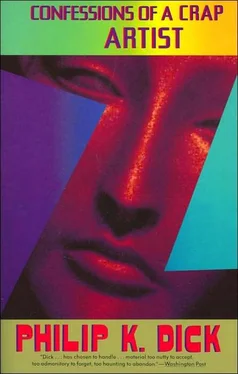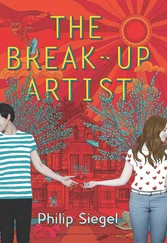“I see,” he said. He sat down on a wicker chair to watch with her. The two girls, after hanging around awhile, went off on their tricycles.
Fay said, “It looks to me like she’s going to have another. See how fat she still is.”
“Don’t you think it’s just the milk?” he said.
“No,” she said.
Later, at sunset, while he was bringing the girls’ tricycles indoors, he saw the ewe lying on her side, again. This time the near part of her shuddered rhythmically, and he realized that Fay had been right. He went indoors to the kitchen. At the stove Fay was mixing a salad.
“You were night,” he said. “She’s in labor.”
Fay said, “It’ll be born dead. If there’s more than an hour lapse between births the second one is always dead.” She left her salad and went to get her coat.
“Maybe not,” he said, knowing nothing about sheep but wanting to say something to cheer her.
Taking the lantern—the sky had become dark and stars were appearing—they walked out across the pasture, to the ewe. Now she had gotten up and was cropping grass. Her lamb lay nearby, its head up.
“I’ll call the vet,” Fay said.
She telephoned the vet and talked with him for a long time. Nat wandered about the house, glancing out now and then at the field. Now he could see only the outline of the eucalyptus trees far off, along the highway.
Appearing from her bedroom, Fay said, “He says to call him back in an hour if nothing happens. He said possibly we could get her to walk around; that might speed up the birth. But he agrees that if it’s been this long there isn’t much chance.”
They had dinner. And then, before cleaning the table, they again put on their coats, got the lantern, and went out onto the field.
The light flashed first on one ewe, then another. “No,” Fay said, continuing to walk. “Flash it over there,” she said, pointing.
In the light he saw the ewe standing up, trailing behind her a web of black. The web, sagging like a cloth hammock, led to a pool of wet black in the grass. To him it looked like refuse, something voided. But Fay, walking toward it, said in a flat, empty voice, “It’s a dead lamb. A big lamb.” Bending down she said, “A perfect lamb. Looks like a male. It must have just been born.” With both hands she began to strip the bloody, wet web from it. Mucus trails covered the lamb’s face. “A male,” she said, turning the lamb over.
“Too bad,” he said, feeling no emotion, only a physical reaction, a revulsion to the blood and mucus web. Not wanting to touch the thing he hung back, now feeling guilt.
Fay reached into the dead lamb’s mouth and opened its jaws. Then she began pressing its nib-cage, again and again. “It’s still warm,” she said. “Usually I come out and find their stiff bodies. This one was too big. It took five hours. He was cut off too long.” Now she had lifted the lamb by its hind legs and was slapping it. “You do this with baby puppies,” she said. “No,” she said. “It’s hopeless. Too bad. A perfect big buck lamb. Isn’t that strange? It gets so far, five months growing, and then it dies. What a shame.” She continued to massage it and clean its face and slap at it. The ewe, with her surviving lamb, had gone farther off. “They know when it’s dead,” Fay said. “Sometimes they’ll nuzzle it for an hour, trying to get it on its feet. She knows this one is dead. She isn’t trying to get it up.” Now she stood up. “Look at my hands,” she said. “Blood all over them.”
He said, “You want me to put it in the garbage can?”
“It’ll have to be buried,” she said.
Now he did not feel so squeamish. He picked it up by its hind feet. How heavy it was. Carrying it before him, he walked back toward the house. Fay came a step or two behind, flashing the light for him.
“Probably she could only have nursed one anyhow,” she said. “We’ve brought them in when they were too weak to get up, and washed them and dried them and fed them kano syrup and water and sent them back out. We never got a buck lamb. They’re so fragile. There’s always a good chance a buck lamb will die—they’re too big to get out.”
Using the pitch fork and shovel he dug a hole near the cypress trees, where the soil was moist.
“Anyhow,” he said, “you still have the other one.”
She said nothing.
“It was impressive,” he said, “to see you go and start removing that stuff from it without hesitation.” Like a farm woman, he thought. And in her shorts and sandals and blue cord coat. No fluttering or squeamishness … she had gotten that firm quality that he thought so much of. The quality that he knew existed in her, one of her best. It would come out, of course, in a situation like this. It had never occurred to her to hang back.
She said, “I should have breathed in its mouth. But I couldn’t bear to. With all that mucus. I guess I better phone the vet back and tell him what happened.” Leaving the lantern propped up for him, she went off into the house.
After he had finished burying the lamb, he washed his hands at an outdoor tap and entered the house after her. The girls had gone off to their rooms to watch tv. On the dining room table the dinner dishes remained where they had been, and he picked up some and carried them to the sink. He wondered where Jack was. Probably in his room; her brother had stayed out of sight, by himself, whenever he came over to be with Fay. He did not even eat with them.
“I’ll do that,” Fay said, appearing. “Leave them.” She lit a cigarette. “Let’s sit for a while in the living room.”
“Where’s your brother?” he said, as they seated themselves.
“At Claudia Hambro’s. A meeting of the group. Special emergency session.” She smoked meditatively.
“Are you depressed?” he said.
Beside him, she stirred about. “A little. More just thinking.”
“The business about the lamb would depress anybody,” he said.
“It isn’t the lamb,” Fay said. “It was seeing you getting ready to do the dishes. You shouldn’t do that.”
“Why not?” he said.
“A man shouldn’t do things like dishes.”
He said, “I thought you wanted me to do them.” He knew how she detested the dishes; she always got someone to do them for her, if not her brother then himself.
“I never wanted you to do them,” Fay said. She stubbed out her cigarette. “You should have said no.” Getting restlessly to her feet she began to pace. “Mind if I pace?” she said, with a quick, mechanical smile, almost a grimace.
Perturbed, he said, “You ask me, but you want me to refuse. You want me to say no to you.”
“You shouldn’t let me get you to do things. It’s wrong—the man should be the stronger one. He should exert his authority. The man is the ultimate authority in a marriage. The woman follows his lead… how’s she supposed to know what’s night and wrong if he doesn’t tell her? I expect you to tell me. I depend on you.”
He said, “And by doing things for you, things you asked for, I’ve let you down.”
“You’ve let yourself down,” she connected. “So I suppose yes, you’ve let me down. The best way to help me is to be yourself and do what you know is night. I’ll respect you more if you assent your moral authority. The children need that.”
He said, “It’s wrong for the children to see a man doing the dishes?”
“Doing anything the woman tells him. They should see him telling the woman what to do. That’s the principal thing I see in you—a deep moral authority. That’s what you bring to this house. We all need that.”
“And by that ‘deep moral authority,’ “he said, having difficulty breathing, “you mean my taking a firm stand and opposing you. Well?” he said. “Suppose I do oppose you? What will you do?”
Читать дальше










